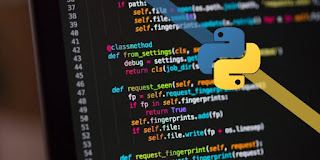I n troduction In today’s data-saturated world, successful businesses aren’t just collecting data but making sense of it. Whether you’re a startup looking to optimize operations or an established enterprise aiming to uncover new revenue streams, business analytics is the key to unlocking smart, strategic decisions. But getting started can feel overwhelming without the proper foundation. That foundation starts with the tools . From organizing raw data to visualizing insights and making data-backed decisions, the right business analytics tools can help transform your business from reactive to predictive, even prescriptive. In this article, we’ll explore five essential tools that every business needs to build a solid analytics strategy and how they fit into a broader data engineering solution designed by data engineers. Top 5 Tools for Business Analytics Power BI / Tableau: Visualize to Realize The first thing that likely comes to mind w...
Python is a general-purpose, high-level, object-oriented, and easy to learn programming language. It was created by Guido van Rossum, who is known as the godfather of “Python”.
Python is a popular programming language because of its simplicity, ease of use, open-source licensing and accessibility — the foundation of its renowned community which provides great support and help in creating tons of packages, tutorials, and sample programs.
Python can be used to develop a wide variety of applications — ranging from Web, Desktop GUI based programs/applications to science and mathematics programs, and Machine learning and other big data computing systems.
Let’s explore the use of Python in Machine Learning, Data Science and Data Engineering.
Machine Learning
Machine learning is a relatively new and evolving system development paradigm that has quickly become a mandatory requirement for companies and programmers to understand and use. See our previous article on Machine Learning for the background. Due to the complex, scientific computing nature of machine learning applications, Python is considered the most suitable programming language. This is because of its extensive and mature collection of mathematics and statistics libraries, extensibility, ease of use and wide adoption within the scientific community. As a result, Python has become the recommended programming language for machine learning systems development.
Data Science
Data science combines cutting edge computer and storage technologies with data representation and transformation algorithms and scientific methodology to develop solutions for a variety of complex data analysis problems encompassing raw and structured data in any format. A Data Scientist possesses knowledge of solutions to various classes of data-oriented problems. And expertise in applying the necessary algorithms, statistics, and mathematic models, to create the required solutions. Python is recognized among the most effective and popular tools for solving data science-related problems.
Data Engineering
Data Engineers build the foundations for Data Science and Machine Learning systems and solutions. Data Engineers are technology experts who start with the requirements identified by the data scientist. These requirements drive the development of data platforms that leverage complex data extraction, loading, and transformation to deliver structured datasets that allow the Data Scientist to focus on solving the business problem. Again, Python is an essential tool in the Data Engineer’s Toolbox — one that is used every day to architect and operate the big data infrastructure that is leveraged by the data scientist.
Use cases for Python, Data Science and Machine Learning
Here are some example Data Science and Machine Learning applications that leverage Python.
- Netflix uses data science too, to understand user viewing patterns and behavioral drivers. This, in turn, helps Netflix too, understand user likes/dislikes and predict and suggest relevant items to view.
- Amazon, Walmart, and Target are heavily using data science, data mining and machine learning to understand the user's preferences and shopping behavior. This assists in predicting demands to drive inventory management and to suggest relevant products to online users or via email marketing.
- Spotify uses data science and machine learning to make music recommendations to its users.
- Spam programs are making use of data science and machine learning algorithm(s) to detect and prevent spam emails.
This article provides an overview of Python and its application to Data Science and Machine Learning and why it is important.
Aezion Inc. Solution Architects, Engineers, and Custom Software Developers can assist you in exploring Python-based solutions for your Data Science and Machine Learning applications. Contact us to learn more.

Comments